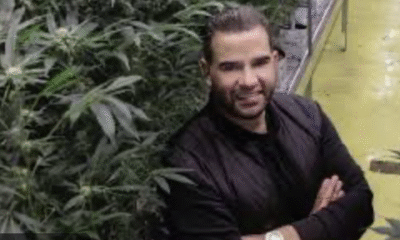featured
Massachusetts Ballot Campaign to End Adult-Use Cannabis Market ‘On Track’ to Collect Enough Signatures
Published
1 day agoon

The signature-gathering phase is “going well” for a coalition that’s aiming to put a question before Massachusetts voters that would backtrack on adult-use cannabis legalization by wiping out the state’s licensed industry.
Massachusetts Attorney General Andrea Joy Campbell certified the petition, “An Act to Restore a Sensible Marijuana Policy,” last month, and now the group has until Dec. 3 to collect 74,574 valid signatures from registered voters to have a shot at qualifying for the November 2026 ballot.
The campaign organizers aim to submit more than 100,000 signatures to the secretary of state, providing a cushion in anticipation of the state’s vetting process to ensure the signatures are valid, group spokesperson Wendy Wakeman told Cannabis Business Times.
“The signature phase is going well. It’s on track,” she said. “The whole process, the initiative petition process, isn’t easy. … While we need to collect 74,000 [signatures], we actually have a goal of collecting over a hundred thousand, and that’s because there are two different vetting processes that the signature sheets, the petitions, will go through.”
Local elections officials must review the signatures by Nov. 19 to ensure they’re from registered voters and match what’s on file, before the petitions are filed with Secretary of State William Galvin’s office two weeks later. Galvin’s office will perform the final count and can toss any petition sheets that are incomplete or mutilated.
“The process at every step is political,” Wakeman said, adding that a coalition of parents, doctors, mental health professionals, educators and others is concerned about the negative effects of cannabis, particularly on youth. This concern serves as the genesis of the campaign to effectively end a $1.6 billion retail industry in Massachusetts that has been serving those 21 and older since dispensary sales launched in 2018.
“[They’re looking at] the impact that the growth of marijuana use has had on the quality of life, the increase in DUI stops, the increase in child poisonings and in pet poisonings,” she said. “There’s a group that coalesces around the idea that we moved too far too fast with marijuana legalization, and that it’s not working well for Massachusetts.”
Meg Sanders, CEO and co-founder of Western Massachusetts-based Canna Provisions, argues that the commonwealth rolled out a highly regulated system that helps ensure cannabis is lawfully grown and sold through a tested, tracked and taxed system that voters approved in the November 2016 election.
The attempt to repeal the state’s program and ban home grows wouldn’t remove demand; it would shift cannabis back to an unregulated, irresponsible system for consumers, Sanders told CBT.
“First and foremost, this question has been asked and answered,” she said. “I believe the voters showed up in 2016 and stated exactly what they wanted to see, which was a regulated cannabis market for adults. … I really hope we don’t have to ask and answer it again.”
For Sanders’ part, she’s tackling the initiative petition head-on through a “do not sign” campaign. Sanders also penned a column this month in the Berkshire Business Journal, telling readers that the 2026 proposal would create chaos for town budgets throughout Berkshire County.
With roughly 130,000 residents, Berkshire County represents nearly 2% of the state’s population and is the beneficiary of more than half a billion dollars in taxed cannabis sales.
Licensed cannabis businesses don’t just support some 27,000 industry workers in Massachusetts, but they also support “contractors, bookkeepers, HVAC technicians, drivers, and the restaurants and inns they patronize,” Sanders wrote.
The cannabis CEO said that while politics is not on the initiative petition’s side, she’s hoping industry stakeholders can nip it in the bud before it potentially lands on the ballot.
Under current market dynamics, cannabis businesses have plenty of other fish to fry, Sanders told CBT; however, the 2026 ballot proposal represents a real threat, and licensed adult-use businesses must pull their resources to defeat it, she said.
“I think prohibition in any form is a real threat, and I think we have to keep our eye on the ball and not assume and not just go about our merry way,” she said. “We’ll talk about it with our customers. We’ll make sure that they’re very aware of it. Please ask them to tell their friends. I just feel like we don’t know what the money behind this initiative is. We don’t understand exactly what’s backing this, but in my opinion, any threat to freedom is a threat that we need to look at.”
The initiative petition organizers don’t see it that way.
While Wakeman is now the spokesperson behind the initiative petition to do away with Massachusetts’ adult-use cannabis program, she wasn’t among the 15 Massachusetts residents who signed the proposal that the attorney general certified last month.
Among the signers were four Massachusetts Republican State Committee members, including Caroline Cunningham, David Lunger, Kathleen Lynch and Timothy Smyth. Cunninham, a political consultant, campaign manager and professional fundraiser, aligned with Smart Approaches to Marijuana (SAM) to defeat a psychedelics legalization ballot measure last year in the commonwealth.
In leading the charge to undo adult-use cannabis legalization in Massachusetts, Cunningham told The Boston Globe in August that the “true purpose” of the initiative is to shut down licensed dispensary sales. “The goal is not to arrest people for simple personal possession,” she said.
Under the proposal, possessing up to 1 ounce of cannabis or 5 grams of concentrate would be decriminalized for those 21 and older, and the state’s medical program would still exist. In 2024, medical cannabis sales made up 9% – roughly $162 million – of the state’s overall licensed marketplace, according to the Massachusetts Cannabis Control Commission (CCC).
While the petition would not eliminate medical cannabis dispensary sales, many patients fear that the certified proposal would implement potency caps of 30% THC on medical flower and 60% THC on medical concentrates, as well as prohibit concentrated forms of medical cannabis that fail to provide a metered delivery serving of 5 milligrams of THC with no more than 20 metered doses (100 milligrams) per package.
Those provisions were included in “Version A” of the group’s two certified petitions; however, Wakeman told CBT that the group plans to solely pursue collecting signatures for “Version B,” which does not include the potency caps and metered dose proposals.
“It is not the one with the THC cap,” she said. “We’re focusing on a petition that rolls back recreational pot stores and the legality of home-grown recreational marijuana.”
Also among the 15 petitioners who signed the now-certified proposal was Nassir Ghaemi, M.D., former president of the Massachusetts Psychiatric Society and a professor of Psychiatry at Tufts Medical Center in Boston. He specializes in depression and bipolar illness.
In addition, unsuccessful Brockton mayoral candidate Richard Reid and his wife, Lynn Reid, also signed the certified proposal. Reid, a pastor of the North Baptist Church in Brockton for the past 17 years, has opposed cannabis legalization since adult-use sales first began in the commonwealth. In May 2018, the city council’s Finance Committee invited Reid to discuss his “concerns with the sale of recreational cannabis in the City of Brockton.”
While Massachusetts voters supported legalization in the 2016 election, those pushing the 2026 proposal to end the adult-use program argue that cannabis reform has failed to live up to its promises.
“One of the things we were sold when voting to accept looser cannabis rules was that the black market would go away, and that just hasn’t happened,” Wakeman said. “The black market is still thriving. … We’ve seen a reduction in crime, because we’re no longer punishing the guy who has a dime bag in his pocket or whatever. But in terms of organized crime, corruption and graft, it hasn’t gone away.”
Cannabis industry advocates often argue that some of the largest contributors to the illicit cannabis market are high taxes, municipal opt-outs (cities that ban dispensaries), shortcomings in track-and-trace systems and restrictive state policies such as prohibition.
Some state markets have struggled to rein in unregulated cannabis activity compared to their legalization peers.
New York, for example, has yet to implement a seed-to-sale tracking system nearly three years after launching adult-use dispensary sales. In California, 53% of cities and counties still ban cannabis businesses, and state residents consume nearly twice as much unregulated cannabis as regulated cannabis, according to the state’s Department of Cannabis Control.
Meanwhile, Arizona requires a self-reporting track-and-track model where licensees are free to use their own software systems to report inventory to the state’s Department of Health Services. Most state cannabis programs mandate a third-party software system, such as Metrc or BioTrack, for their seed-to-sale tracking.
Sanders argues that Massachusetts has one of the strictest regulatory structures for its licensed marketplace and that legalization was never meant to completely eradicate the unregulated market.
“What I know for sure in Massachusetts is we use a seed-to-sale tracking method that is required by the state. Every gram has to be accounted for and has to be counted and recounted,” she said. “What I know for sure is that if you eliminate the adult-use market, you will see a massive increase in the illicit market.”
Instead of backtracking on legalization, Sanders encourages awareness of the guardrails surrounding the Massachusetts adult-use cannabis program, from the seed-to-sale tracking system to requirements for age-gating, testing, labeling and childproof packaging.
“I think that’s a really important thing,” Sanders said. “Prohibition doesn’t work. The United States has shown this time and time and time again, and this notion that ‘Oh, we’re just going to reinvigorate the medical program’ is just a fool’s errand. That’s really what they want to do. As I mentioned before, there are many things that they could do with the Legislature and the CCC to make the medical program stronger here in Massachusetts.”
Eliminating regulated and tested adult-use products from the state’s cannabis market would be “terrifying” for consumer safety, she said.

Author: mscannabiz.com
MScannaBIZ for all you Mississippi Cannabis News and Information.
You may like
-


Raw Garden Acquires ‘California Love’ to Grow Clean Cannabis Movement
-


Rhode Island Marijuana Officials Approve Timeline For Awarding New Dispensary Licenses
-


‘Rent-a-License’ Scheme Highlights New York Cannabis’s Track-and-Trace Problem
-


Alcohol Industry Steps Up Lobbying On Hemp Drinks As Congress Debates THC Ban
-


Cannabis Mogul Appointed Ambassador To Middle East Country
-


Pennsylvania Senators Approve Bipartisan Cannabis Bill To Create New Regulatory Body
featured
Raw Garden Acquires ‘California Love’ to Grow Clean Cannabis Movement
Published
45 minutes agoon
October 21, 2025
[PRESS RELEASE] – SANTA BARBARA, Calif., Oct. 21, 2025 – Raw Garden, California’s leader in clean cannabis for more than a decade, announced the acquisition of the California Love cannabis brand in a move focused on increasing access to clean and safe cannabis across the state. The deal comes as part of Raw Garden’s highly selective approach to growth and partnerships, rooted in the ethos of supporting small, values-aligned farms that are connected to their communities and meet their highest standards.
Founded in 2015, Raw Garden has been a part of the Clean Green Certification Program since the beginning. The company remains committed to testing for hundreds of pesticides and potential contaminants, far more than the 66 currently required by the state, and offers 100% transparency by publishing all results on its website. Earlier this year, Raw Garden also helped launch ECCO (Environmentally Conscious Consumer Organization), because the cannabis industry needed a higher standard – one built on safety, purity and sustainability.
For Raw Garden, clean isn’t just a buzzword; it’s an obsession. Every farm and facility undergoes rigorous compliance checks to ensure that when you choose Raw Garden, you’re choosing clean, contaminant-free cannabis every time.
“The purchase of California Love will expand the clean cannabis movement as well as serve as inspiration for others who want to make the switch to clean farming practices,” Raw Garden CEO Thomas Martin said. “We are excited about the growth we have seen with California Love, and the goal with this purchase is to provide easier access for people who want clean, pure cannabis flower.”
Based in Grover Beach, California Love is currently available in more than 130 retailers throughout the state. Going forward, the brand will be subject to the same rigorous standards as Raw Garden and undergo the same third-party testing to ensure consumers of both brands enjoy the same clean quality and attention to detail.
“For us, the certifications aren’t just a badge; they’re a reflection of our obsession with clean cannabis,” Raw Garden Vice President of Manufacturing Mickey Esdale said. “From our oil-based vapes to our flower, every product is held to the highest standard, because purity should never be optional. We don’t just meet industry standards; we push them forward. Our customers deserve full transparency and the confidence that what they’re smoking is as clean and sustainable as it gets.”

Author: mscannabiz.com
MScannaBIZ for all you Mississippi Cannabis News and Information.
featured
Rhode Island Marijuana Officials Approve Timeline For Awarding New Dispensary Licenses
Published
2 hours agoon
October 21, 2025
“We reserve the right to delay this process depending on several external factors outside our control. For example, if we receive thousands of applications, it will be hard for us to do that.”
By Christopher Shea, Rhode Island Currant
Rhode Island’s cannabis regulators could begin awarding new retail licenses to prospective business owners eager to join the state’s budding market as early as May 2026.
That’s according to a timeline the Cannabis Control Commission voted 2-1 to adopt on Monday. The timeline sets the pace for officials to review applications for the state’s 24 available retail licenses after the application deadline on December 29, 2025.
“It’s clear to me that we need to do a better job forecasting what the next months look like after the application portal closes at the end of this calendar year,” Commission Chairperson Kimberly Ahern said. “We have never shared what 2026 held.”
Starting January 1, 2026, the state’s Cannabis Office will have 90 days to review applications and verify that each meets eligibility qualifications before being placed in a lottery. The timeline builds in at least 60 days to allow applicants to secure approvals at the local level in order to qualify for random selection, Ahern said.
Ahern said the intention is to begin the lottery selection process in the second quarter of 2026, likely in May.
“I want to add that we reserve the right to delay this process depending on several external factors outside our control,” Ahern said. “For example, if we receive thousands of applications, it will be hard for us to do that.”
As of Monday, no retail applications have been submitted to the state’s cannabis office, spokesperson Charon Rose told Rhode Island Current after the meeting.
Objections on getting ducks in a row
Commissioner Robert Jacquard, the lone vote against regulators’ review timeline, argued that allowing businesses to secure local zoning approvals after the application deadline is unfair to those who met the requirements on time.
“If an applicant is better prepared, better financed, got an earlier start, I think that’s important,” he said. “We have had our regulations out for a good amount of time, people were well-warned that there would not be any extensions beyond the deadlines that were set.”
Those same feelings were shared by many of the members of Rhode Island’s cannabis industry who attended the meeting within the Public Utilities Commission’s office building in Warwick.
“Many of us have invested significant time and money securing compliant locations, paying for rent, purchasing properties, and obtaining special use and zoning permits,” Karen Ballou, owner of CultivatingRI, told commissioners. “I recognize some municipalities have made it difficult for applications to meet certain requirements, but that should not penalize those who have successfully navigated the process.”
Business owners awarded medical cannabis licenses have faced setbacks opening in Woonsocket and Foster amid disputes with local officials and property owners, causing them to miss the state’s initial nine-month deadline to begin operations.
And not every town is willing to have a cannabis retailer. In 2022, voters in six communities—Barrington, East Greenwich, Jamestown, Little Compton, Scituate and Smithfield—rejected allowing retail pot shops within their borders.
Ballou said if regulators really need to give some applicants more time to get all their needed material together, those businesses should be subject to a second lottery.
Sasha Gorski, co-owner of the cultivation company Talaria, agreed, saying the 60-day window to secure local zoning permits after the application deadline shouldn’t apply to general retail applicants.
“It hurts to be punished for being ahead,” she said.
But others in the room argued the commission’s review timeline helps to create a sense of fairness as the retail industry starts to grow in Rhode Island.
“Applicants need breathing room to go through the proper channels,” Emma Karnes, an organizer for United Food and Commercial Workers Local 238, told the commission. “I think we all want a healthy pool of applicants. We all want a reasonably accessible application process.”
Karnes said many applicants seeking social equity and worker cooperative licenses may not have the same resources and capital as other prospective business owners. Such is the case for Alexa Goodrich-Houska, who is seeking to open the Living Room Cannabis Cooperative somewhere in Zone 1, which includes the communities of Burrillville, Cumberland, Glocester, North Smithfield, Smithfield and Woonsocket.
“We don’t have trust funds, we don’t have big corporate backers,” Goodrich-Houska said. “Documentation alone can take four to 12 months and around $50,000 to know if we can even get a license.”
That’s on top of the $7,500 application fee, a yearly $30,000 licensing fee that all cannabis retailers face—though that application fee will be waived for the first year for approved social equity applicants.
Ahern acknowledged industry members’ concerns and continued frustration over new licenses not yet being issued, but reminded them it was never going to be a rubber stamp process.
“We expect a very robust, thorough process,” she said. “That was never going to be done overnight, that was never going to be done in a few weeks.”
Under the 2022 act that legalized recreational cannabis, the commission can offer 24 new licenses to retailers, with six reserved for social equity applicants and another six reserved for worker-owned cooperatives. All recreational licenses will be spread throughout six geographic zones, with a maximum of four stores per zone.
Applicants have up to 60 days to demonstrate they have final zoning approval from the municipality where they intend to operate their business—a provision Ahern said was included partly because of the commission’s slow rollout in getting potential social equity applicants certified.
The commission in late August opened the initial screening process for social equity applicants, defined as prospective retailers owned or mostly staffed by those adversely affected by the war on drugs. After the certification deadline closed on September 29, the commission reported 94 potential applicants for the state’s six social equity licenses.
Beginning Monday, screened applicants were expected to receive letters informing them if they meet the state’s social equity criteria. Prospective applicants who don’t initially meet the commission’s requirements will have 10 additional days to prove they qualify as social equity applicants.
Regulations approved by the commission earlier in the year require that social equity applicants have at least 51 percent ownership and control by individuals directly impacted by past cannabis laws or economic disparities, or a minimum of 10 full-time employees that meet the same criteria.
Qualifying factors include convictions for nonviolent cannabis offenses or residency in disproportionately impacted areas—which can be determined by federal poverty level, unemployment rate, the number of students in a free school lunch program and historic arrest rates by census tract.
Final certification is expected to be approved by the commission some time in November.

Author: mscannabiz.com
MScannaBIZ for all you Mississippi Cannabis News and Information.
featured
‘Rent-a-License’ Scheme Highlights New York Cannabis’s Track-and-Trace Problem
Published
3 hours agoon
October 21, 2025
New York cannabis regulators are attempting to oust a licensed operator from the adult-use marketplace whom they’re accusing of “aiding and abetting” in unlicensed processing activity through a reverse licensing scheme.
The state’s Office of Cannabis Management (OCM) filed multiple charges Oct. 20 against Omnium Health Inc. (d/b/a Omnium Canna), a licensed adult-use processor and distributor in Long Island.
The OCM claims that a February 2025 investigation uncovered contracts between Omnium and unlicensed operators whom Omnium charged rent, allowing them to use its facilities and resources to manufacture and package cannabis products that landed on licensed dispensary shelves as part of a “rent-a-license” scheme.
“Omnium’s alleged conduct is a blatant breach of the licensing rules designed to ensure transparency and fairness in the legal market,” OCM Executive Deputy Director Felicia A. B. Reid said in an Oct. 20 press release. “Our state’s cannabis laws are clear: Licenses are not transferable and only licensed operators may produce and distribute cannabis. OCM’s move today ensures that regulated businesses do not exploit loopholes or take advantage to undermine legal operators who play by the rules.”
In filing a notice of pleading, OCM is attempting to revoke Omnium’s licenses and prevent the company from applying for future licensure.
The state’s regulators are also seeking civil penalties related to the projected revenue from the sale or possession of any unregulated cannabis products, as well as the recall and destruction of those unregulated products.
“Omnium’s actions violated core principles of our regulatory framework and placed unvetted operators into the heart of New York’s legal market,” said Stephen Geskey, OCM deputy executive director of labs, compliance and licensing. “This is a textbook example of reverse licensure, and OCM will not tolerate it.”
The possibilities of “reverse licensure” in New York’s adult-use cannabis market are exacerbated by the state’s delay in implementing a third-party seed-to-sale tracking system nearly three years after adult-use dispensary sales launched in December 2022.
The OCM plans to integrate track-and-trace provider Metrc’s software and technology into the state’s adult-use program by Dec. 17 for all licensees. Access to Metrc’s application programming interference (API) and testing endpoints will be available on Oct. 12 for operators to begin the transition.
The majority of state cannabis programs have a third-party provider, like Metrc or BioTrack, to help prevent product diversion or inversion. Without a system in place, former New York Cannabis Control Board Member Jennifer Gilbert-Jenkins called product inversion the state’s “dirty secret” during a December 2024 board meeting.
“How are we validating that the products in stores are actually coming from New York State?” she questioned. “Because the rate of inversion in this market is the dirty secret that everybody is talking about … that the amount of product that’s coming into our legal, authorized dispensaries from out of state is displacing New York product.”
In February 2025, the OCM launched a Trade Practices Bureau dedicated to safeguarding the integrity of the state’s cannabis program through investigating violations, abuse and noncompliance to hold “bad actors” accountable.
In seeking revocation, debarment and monetary penalties against Omnium in this week’s announcement, the OCM also ordered a statewide retail recall of Omnium-linked products. In Monday’s release, the OCM included a photo of a product’s packaging labeled “Omnium d/b/a MFused.” OCM investigators concluded that MFused rented Omnium’s premises and license.
In covering the OCM’s investigation, The New York Times reported that not only is Mfused connected to Omnium, but so too are popular brands Stiiizy and Grön. The article states that Grön continues to rent space in Omnium facilities and draws attention to another article that details Grön’s business partnerships with licensees in other states.
Grön, which has a Type 2 processing license in New York, called the NYT’s article “inaccurate” in a company statement provided to Cannabis Business Times:
“We are disheartened and disappointed with the inaccurate reporting done by the New York Times today in an article that misrepresents our relationships, business practices and general code of conduct in New York. The article, about challenges facing a former partner of ours in New York State, suggests that Grön – a company with an unparalleled reputation in the cannabis industry for transparency and compliance, which are core values of our business – participated in improper licensing and manufacturing in New York State. These claims are entirely false, and we implore the New York Times to review this matter and issue a correction at once.”
An edibles brand from Oregon, Grön contests that it operates in a building completely independent of Omnium under full compliance with the OCM.
“Our relationship with Omnium was short, and during that time, Grön operated in total compliance with OCM’s regulations, which expressly permit out-of-state brands to partner with existing New York processing licensees, proving there is zero merit to any story of questionable material being used,” according to the company statement.
In February, the OCM’s newly launched Trade Practices Bureau (TPB) examined Omnium’s audit and inspection records, reviewed contracts between the company and other businesses, and interviewed several witnesses, according to the OCM.
In Monday’s notice of pleading, the OCM also accused Omnium of material misrepresentation and failing to disclose substantial changes to its business operations.
“Reverse licensing has no place in New York’s market,” TPB Director James Rogers said. “This kind of cheating robs compliant businesses of their right to compete in a fair market. Acting Executive Director Reid set up the bureau to address these kinds of threats to market integrity. The TPB team is grateful to all the individuals who came forward with crucial information and encourage others to do the same. If we work together, we can keep New York’s cannabis market above board.”

Author: mscannabiz.com
MScannaBIZ for all you Mississippi Cannabis News and Information.

Raw Garden Acquires ‘California Love’ to Grow Clean Cannabis Movement

Rhode Island Marijuana Officials Approve Timeline For Awarding New Dispensary Licenses

‘Rent-a-License’ Scheme Highlights New York Cannabis’s Track-and-Trace Problem

Alcohol Industry Steps Up Lobbying On Hemp Drinks As Congress Debates THC Ban

Cannabis Mogul Appointed Ambassador To Middle East Country

Pennsylvania Senators Approve Bipartisan Cannabis Bill To Create New Regulatory Body

Ahead Of New Jersey Governor Election, GOP Candidate’s Comments On Marijuana As A ‘Gateway Drug’ Resurface

Urgent Action Needed To End US Marijuana Arrests

Supreme Court takes up cannabis & gun rights case (Newsletter: October 21, 2025)

What Winning Looks Like: The New Jersey Dispensaries Playing a Different Game

Trump Taps Marijuana Industry ‘Visionary’ As Special Envoy To Iraq

Delaware Scam Claiming to Represent State-Licensed Dispensary Offering Illegal Cannabis Deliveries – Ganjapreneur
New York Should Legalize Psilocybin Therapy, Former Narcotics Prosecutor Says (Op-Ed)

Do Public Votes About Cannabis Matter Currently

Ohio Lawmakers Will Take Up Bill To Revise Voter-Approved Marijuana Law And Add Hemp Market Restrictions This Week

The Best Microdosing Strains For A Rough Week
Rubicon Organics Announces Health Canada Cultivation License For Cascadia Facility

Building Community, One Bagel at a Time

Supreme Court to Decide Whether Federal Gun Ban Applies to Cannabis Consumers

Florida Marijuana Legalization Campaign Sues State Over Alleged ‘Unlawful’ Attempt To Invalidate 200,000 Signatures For 2026 Ballot Initiative

Does Skateboarding Need To Level Up

Planet 13 Opens 34th Florida Dispensary in Pace

A Long Strange Trip: Yelawolf and Edward Crowe Bring Blotter Art to Life

La Crosse, WI Reduces Marijuana Possession Penalties to $1 Fine

Alert: Department of Cannabis Control updates data dashboards with full data for 2023

Connecticut Appoints The US’s First Cannabis Ombudsperson – Yes there is a pun in there and I’m Sure Erin Kirk Is Going To Hear It More Than Once!

5 best CBD creams of 2024 by Leafly

Recreational cannabis on ballot for third time in South Dakota

EU initiative begins bid to open access to psychedelic therapies
New Study Analyzes the Effects of THCV, CBD on Weight Loss

5 best autoflower seed banks of 2024 by Leafly

Free delta-9 gummies from Bay Smokes

Discover New York’s dankest cannabis brands [September 2024]

May 2024 Leafly HighLight: Pink Runtz strain

Press Release: CANNRA Calls for Farm Bill to Clarify Existing State Authority to Regulate Hemp Products

5 best THC drinks of 2024 by Leafly

Local medical cannabis dispensary reacts to MSDH pulling Rapid Analytics License – WLBT

6 best CBD gummies of 2024 by Leafly

Curaleaf Start Process Of Getting Their Claws Into The UK’s National Health System – With Former MP (Resigned Today 30/5/24) As The Front Man

Horn Lake denies cannabis dispensary request to allow sale of drug paraphernalia and Sunday sales | News

5 best delta-9 THC gummies of 2024 by Leafly

Mississippi city official pleads guilty to selling fake CBD products

The Daily Hit: October 2, 2024

Nevada CCB to Accept Applications for Cannabis Establishments in White Pine County – “Only one cultivation and one production license will be awarded in White Pine County”

5 best THCA flower of 2024 by Leafly

Weekly Update: Monday, May 13, 2024 including, New Guide for Renewals & May Board meeting application deadline

6 best hemp pre-rolls of 2024 by Leafly

PRESS RELEASE : Justice Department Submits Proposed Regulation to Reschedule Marijuana
Trending
-

 California Cannabis Updates1 year ago
California Cannabis Updates1 year agoAlert: Department of Cannabis Control updates data dashboards with full data for 2023
-

 Breaking News1 year ago
Breaking News1 year agoConnecticut Appoints The US’s First Cannabis Ombudsperson – Yes there is a pun in there and I’m Sure Erin Kirk Is Going To Hear It More Than Once!
-

 best list1 year ago
best list1 year ago5 best CBD creams of 2024 by Leafly
-

 Business1 year ago
Business1 year agoRecreational cannabis on ballot for third time in South Dakota
-

 Business1 year ago
Business1 year agoEU initiative begins bid to open access to psychedelic therapies
-

 cbd1 year ago
cbd1 year agoNew Study Analyzes the Effects of THCV, CBD on Weight Loss
-

 autoflower seeds1 year ago
autoflower seeds1 year ago5 best autoflower seed banks of 2024 by Leafly
-

 Bay Smokes1 year ago
Bay Smokes1 year agoFree delta-9 gummies from Bay Smokes



